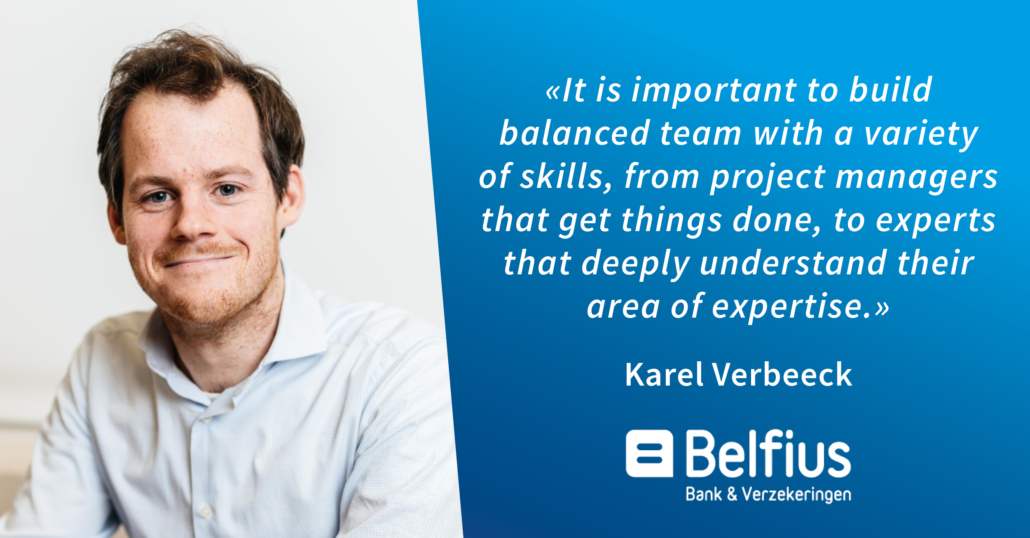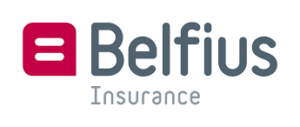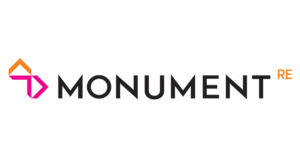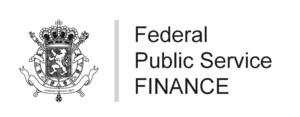This month, we have the privilege to get a (virtual) face-to-face with Karel Verbeeck, Domain Director Mobility & Actuarial team at Belfius Insurance. As a Senior Executive, he is responsible for driving forward all mobility products (car, travel, fleet, etc.) and the actuarial teams across all non-life products (pricing, monitoring, etc.) for the Belfius and DVV brand. Mobility is one of the trendiest topics within the industry so it is the perfect occasion for us to get Karel’s insights about that domain.

Hi Karel! Can you tell us about your career path?
Sure. In 2011, I started at KBC Insurance as an Actuary. I worked there for 2 years as an intern within the Non-Life Department. I did a bit of everything from pricing and reserving to Solvency II. After that internship, KBC offered me the opportunity to do a couple of projects within product development and beyond. After more than 5 years at KBC, I decided to take a step forward in my career by joining Boston Consulting Group (BCG) as a Strategy Consultant.
It’s unusual for an actuary to join one of the top three strategy consulting firms (McKinsey, Bain, or BCG). What did you learn during those four years at BCG?
First of all, it pushed me out of my comfort zone and allowed me to learn a new skill set. It requires deep diving in specific topics within a specific client context, while at the same time adopting a helicopter view. Besides, I had the opportunity to discover new industries like banking, and to broaden my expertise beyond product & pricing.
This experience also gave you the opportunity to work abroad. Can you tell us more?
Indeed, I worked mainly in Benelux and UK. The insurance world in the UK and the Netherlands is typically more evolved, more digitalized and more price competitive. Compared to the Belgian market, those countries are ahead of us on a couple of dimensions. This experience enriched me, personally and professionally.
That leads us to Belfius…
Yes! I joined Belfius a year ago as Domain Director of Mobility, where I am managing the product team and the business analysts within mobility and the actuarial teams that are responsible for the pricing of non-life products and the optimization of our non-life portfolio.
What do you like most about your job at Belfius?
There is a very strong focus in Belfius on innovation and continuous improvements, ensuring we optimize our offerings to our customers. I strongly believe this is the right way to go. Besides, in the mobility domain, things are changing very fast and we must evolve at the same pace. For someone who likes change and development, I am at the right place!
The future of mobility is quite a hot topic today. What are the current and future challenges for all actuaries working on those products?
There are a couple of trends to be aware of. First, on the short run, we see a clear move towards electric vehicles. What are the needs of their drivers? Also, the claims for those vehicles are quite different from what we are used to, clearly impacting the required pricing strategy.
In addition, we see big changes in the way we mobilize ourselves, further accelerated by Covid-19 and the increased energy prices. Europe is not a front-runner here, whereas in the US, things have already shifted more. In the rural environments, I expect the car to remain the prime mode of transport for our daily activities. Conversely, in big cities, the uses are more and more varied. In that case, your customers are not facing the same risks anymore, requiring insurers to rethink their business model. Also here, how does it impact the risks we are covering and the corresponding prices?
These are only a first selection of trends, I have not even started about the large amount of data cars generate nowadays, and the information and complexity it could bring to our price models.
As a director, how would you describe your management? What are the profiles you are looking for?
At this moment, my team is made up of 27 people. I believe it is important to build balanced team with a variety of skills, from project managers that get things done, to experts that deeply understand their area of expertise. In all cases, I prefer working with people that proactively take responsibility and have a positive, can-do mindset.
If I look at my management style, I try to avoid micromanagement as much as possible, as it is only counterproductive in the long run. I believe it is important to give people the freedom to build their expertise by themselves and have the confidence to come up with their own solutions. In my eyes, the job of a manager is to bring clarity and guidance on the general direction, coach the team and challenge the outcomes.
An experience during your career that has marked you the most?
My first experiences as a manager taught me the importance of keeping focus. We are living in a world where a lot of things are shifting, and nobody is 100% clear on what the future will look like. As a result, a lot of companies are facing multiple issues and tend to generate plenty of ideas to act upon opportunities.
More than ever, I try to keep myself and my teams focused on a couple of key priorities. Tackling 1000 topics at the same time is more likely to result in a lot of work, with often limited impact on the organizational goals.
A lesson learned during your career?
Always aim to be output-oriented. If you kick of a new project, block some time in your agenda to think up-front how the ideal solution would look like and what are the steps you need to take to get to this solution. Whether it is about determining a new price, creating a new value proposition, reviewing a process – it keeps you focused on the end-goal.
If you could change one thing about your job?
I would add a bit of travelling to other countries – always fun to see new places.
Let’s finish with our last signature question, the one we ask everyone to end an interview. Whether personal or professional: what would you like to do that you haven’t done yet?
Adopting a cat!



















